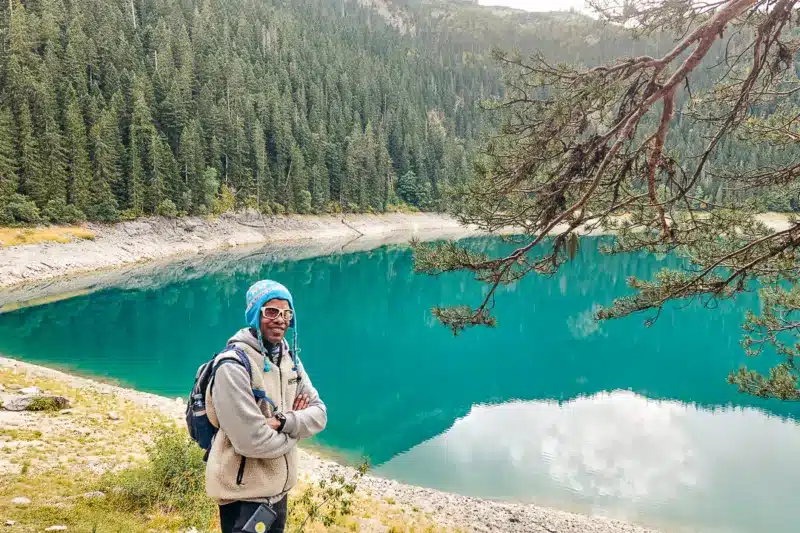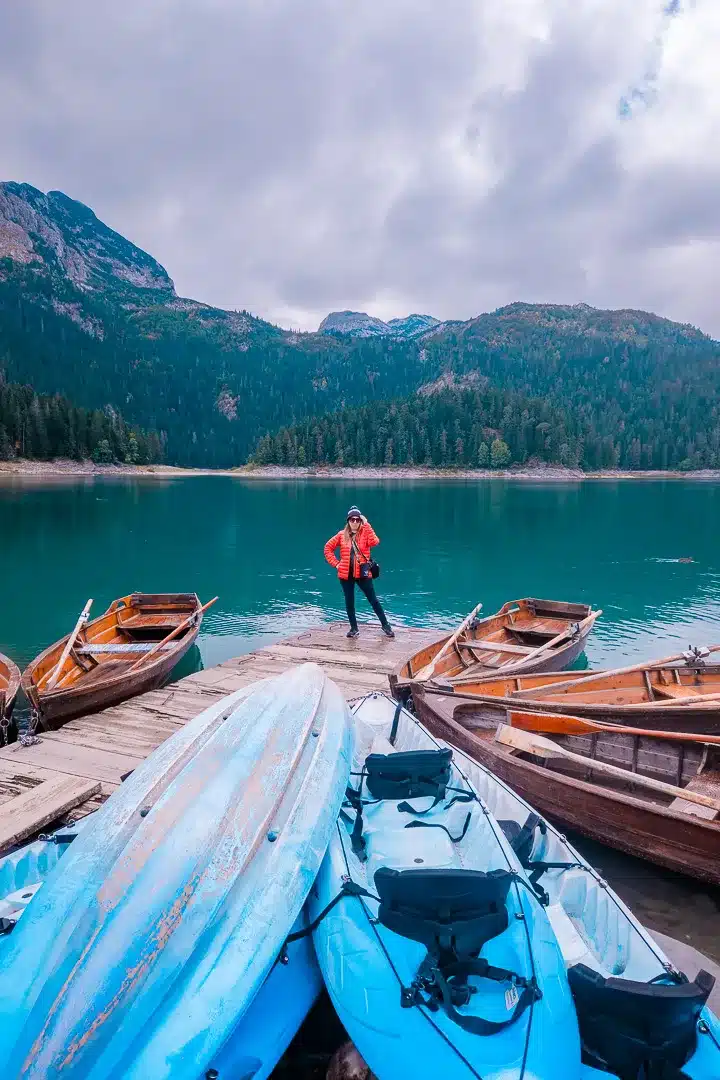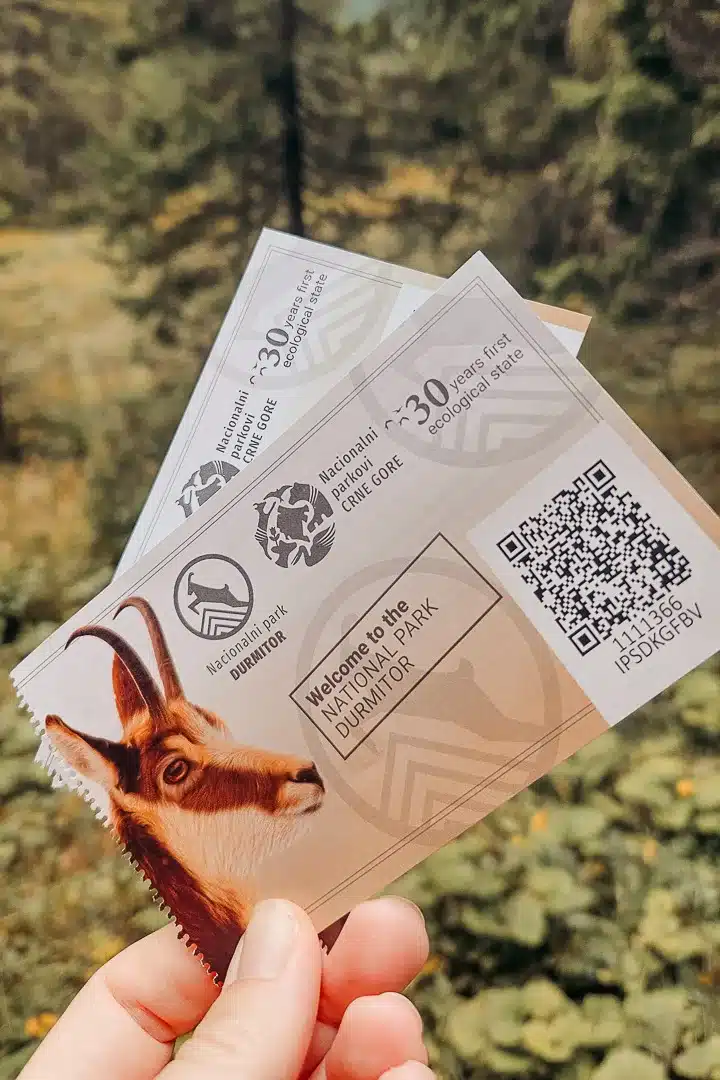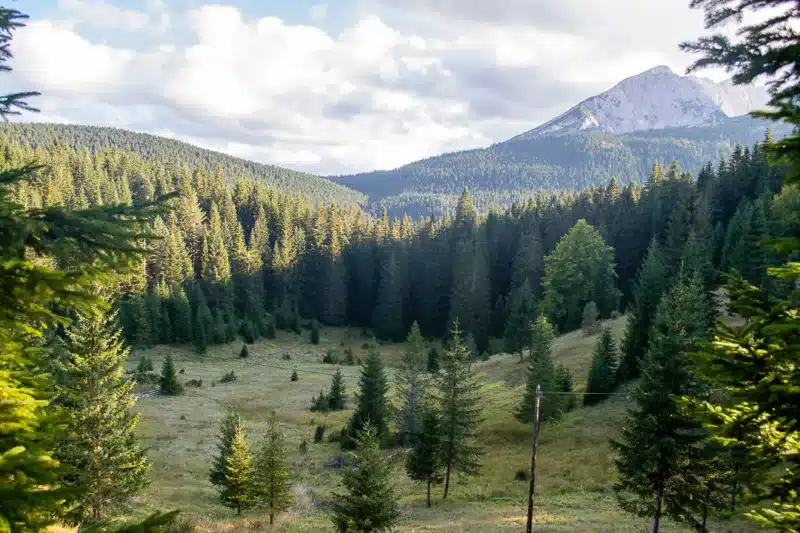Durmitor National Park, Montenegro: What You Need to Know
Durmitor National Park is Montenegro’s wild heart. The dramatic landscape draws you in with its mix of jagged peaks, canyons, and mirror-like glacial lakes. A UNESCO World Heritage Site, it’s home to Tara Canyon, Europe’s deepest gorge, and Žabljak, the highest town in the Balkans.
I explored Durmitor National Park on foot, hiking through dense forest and craggy mountain ridges. Navigating without a car added an extra challenge, but it’s doable with the right planning. This guide is packed with practical advice for car-free travellers, useful tips, and everything you need to make the most of your trip.
Expect sudden weather shifts, the refreshing scent of pine lingering in the air, and landscapes that make you feel like you’ve stepped into a postcard. Durmitor National Park is a place not to be missed on your Monenegro itinerary.
Some posts on this site contain affiliate links to products or services I’ve found useful. If you make a purchase through these links I may earn a small commission (at no extra cost to you). This helps keep the travel blog running, so thank you.
How to get to Durmitor National Park (without a car)

Durmitor National Park is worth making the effort required to get there. Žabljak is the town to head for, with entrances to the park, accommodation, supermarkets and tours.
Podgorica to Durmitor National Park by bus
I travel without a car and was determined not to miss out on this spectacular landscape on my visit to Montenegro.
After some research I worked out that the way to fit it in would be to take the train to Podgorica, from Lake Skadar, and then swap onto a bus. There aren’t any trains from Podgorica to Durmitor National Park.
The bus station in Podgorica leaves a lot to be desired but it did have toilets and refreshments, so what more do you really need? The announcement system and screens can be confusing so make sure to ask what bay number your bus will arrive at.
I was expecting a coach for my trip from Podgorica to Durmitor National Park but the bus was more of a minibus size.
Mr Flip Flops Included gets motion sickness and found the winding roads as we approached Žabljak challenging. If you suffer too, don’t forget to pack whatever you take to help.
I enjoyed the trip, as the vast Montenegrin countryside spread-out as far as the eye could see. The little wooden chalet-style houses dotted about the green fields reminded me of Swiss hillsides.
The journey took two and a half hours, as advertised, and we arrived at Žabljak as darkness fell.
Pro tip: at larger bus stations in Montenegro, you have to pay a couple of euros to use the bus station and a few euros to the driver for any large bags you take on the bus, on top of your ticket price. Make sure you have change for this.
Podgorica – Durmitor bus: essential information
If you’re hiring a car, you can reach Žabljak in two hours from the capital Podgorica.
Kotor to Durmitor National Park by bus
You can also get to Durmitor National Park by bus from Kotor. I spent a week exploring Kotor without a car and did the three-hour journey from to Durmitor in reverse, heading to Kotor by minibus, from Žabljak.
This was the most uncomfortable bus trip I did in Montenegro. The bus was tiny, overly full and the driver didn’t want to stop for a toilet break until the passengers revolted. However, it did get me from A to B (or Z to K).
The Žabljak to Kotor route is seasonal, and timetables are only available shortly before the summer season starts, around May. There are plenty of things to do in Kotor whilst you’re there.
Pro tip: buying a ticket in advance doesn’t guarantee you a space on the bus. Places are limited on the Žabljak – Kotor route so get to the bus station at least a good 30 minutes before the bus is due to leave.
Budva to Durmitor National Park by bus
There isn’t a train or a bus that goes direct from Budva to Durmitor National Park. You will need to head to Podgorica or Kotor from Budva by bus or train, then follow the info above.
If you’re visiting Budva first on your Montenegro trip, check out my guide for how to get from Tivat Airport to Budva.
Alternative transport options
If you don’t fancy the bus, you could book a tour. Prices in Montenegro are reasonable for excursions. Getting someone to do all the organising for you is a great way of taking the stress out of travel planning your trip to Durmitor.
How to get around Durmitor National Park

Once you’ve arrived at Žabljak, you’ve got several options for exploring. Each option has its benefits, depending on your fitness, budget, and sense of adventure.
Hiking trails

Durmitor is a hiker’s paradise, with trails ranging from easy flat walks to very challenging climbs.
Many routes start right from Žabljak, so you won’t need extra transport, but they do take a bit of time to get into the most picturesque and interesting parts of the National Park.
Make sure to wear sturdy footwear and carry plenty of supplies. The terrain can be rugged, and the weather changes quickly. It was unseasonably cold on my trip.
Bike rental
Bikes are a way to cover ground and access trails that are too far to walk. Rentals are available in Žabljak, and the scenic rides are worth the effort.
Paths can be steep or rocky, so this is best for confident cyclists, and you’ll want an e-bike.
You can cycle around the ring of Durmitor in a day (approximately seven hours). A day’s e-bike hire costs from €70.
Public transport
Local bus options are infrequent but do exist. There’s a bus to Tara Canyon (search for ‘Đurđevića Tara’ on the bus timetable) which takes half an hour. You could combine this with a taxi in the opposite direction if the return times don’t suit your plans. Note that there is no Uber in Montenegro.
Guided tours
For a hassle-free experience, book a jeep safari or guided tour. These let you explore harder-to-reach spots and include a guide who can share their local knowledge with you.
It’s a more expensive option but ideal if you’re short on time or prefer not to risk the less reliable options.
Car hire
Hiring a car gives you maximum flexibility to visit the park’s more remote areas. Some mountain routes can be narrow and winding. If you’re not used to driving in such conditions, take it slow and plan your route carefully.
Best things to do in Durmitor National Park

There’s something magical about Durmitor National Park. Although I was feeling unwell and the weather was frankly awful for most of my visit, it still managed to provide me with unforgettable adventures.

Here are five activities not to miss at Durmitor National Park.
1. Visit Black Lake (Crno Jezero)

This iconic spot is a must-visit on your trip to Montenegro and good for all ages. The mostly flat trail around the lake is an easy one hour walk.
I was initially sceptical when I saw the crowds pouring out of coaches at the entrance. But once I stepped onto the lakeside path and wandered away from the cafés and toilets, the tranquillity won me over.
The deep turquoise water, fresh pine scent, and picture book-shaped trees make it a true natural paradise.
Pro tip: visit late in the day for fewer crowds and make sure to explore away from the main entrance point.
2. Hike the trails

Durmitor’s trails are among the best in Europe, offering options for all fitness levels. There are 25 marked trails.
The three lakes loop is a relatively easy hike, which takes in Crno Jezero, Barno Jezero and Zminje Jezero. The walk is signposted and much of it is on good trails.

Katun Lokvice is a fantastic choice for a more challenging hike, with stunning valley views, and Sedlo Pass offers dramatic mountain scenery.
I managed to take a very long way around to Katun Lokvice on my visit. It took over five hours and I fell over several times on the way, as I scrambled across almost perpendicular marked trails that were anything but easy. Not my finest moment.
For a serious challenge, the summit of Bobotov Kuk is a popular spot to aim for. At just over 2500 meters high, the tallest mountain in Montenegro is not for the faint-hearted.
If hiking isn’t your thing, you can drive to some of these spots or join a guided tour for a safer way to explore the area.
For more hikes in Montenegro, don’t miss my guide to the Ladder of Kotor hike in Kotor.
3. Canyoning
Canyoning in Montenegro is a total bucket-list activity, thanks to its dramatic landscapes.
Most tours in Durmitor are for adventurous beginners, like me, with moderate difficulty and durations of about 3 to 5 hours. I’d planned to try it at Durmitor myself but had to cancel because of a freak storm and falling ill.
I did finally manage canyoning later in my trip, at Budva, and it was equal parts terrifying and exhilarating.
If you’re new to it, Durmitor’s terrain makes for an epic first canyoning adventure.
4. Ziplining

Tara Canyon is the deepest canyon in Europe, and ziplining over it is a popular activity to do at Durmitor.
Several operators offer lines of different lengths and speeds, so you can pick the one that suits your thirst for adventure.
The canyon is about 30 minutes’ drive out of the town of Zabljak, so you’ll need to drive, take a taxi or the bus to get there. The zipline tours that I found in Zabljak did not include transport.
5. Rafting on the Tara River
If you’re up for even more adrenaline adventures, rafting down the Tara River is another great thing to do in Durmitor.
The canyon’s towering cliffs create a memorable backdrop to your trip. Most tours include a guide, safety gear, and lunch by the riverbank.
Other activities at Durmitor National Park

If you have more time, consider a Via Ferrata climb, or taking the ski lift at Savin Kuk Ski Centre for epic panoramic views across Durmitor National Park. If you’re in need of more adrenaline, take to the skies and paraglide above the park.
Canyoning, rafting, and ziplining typically cost from €40 to €60 per person.
Planning a trip to Montenegro? Check out these key services
📱How to get internet and calls in Montenegro?
Get an eSIM card so you can use internet and calls in Montenegro, which is not included in most free roaming packages.
🚖 How to book an airport transfer?
Get picked up and go directly to your location in Montenegro with this convenient airport transfer.
📌 What’s a great site to find tours and experiences?
Check out the best tours and activities in Montenegro with Viator, like this wonderful food tour of Kotor.
🚗 How to hire a car?
Explore Montenegro at your own pace with a rental car from Discover Cars.
🛌 How to find hotels?
Find a great deal for your accommodation in Montenegro with Booking.com.
When to visit Durmitor National Park

Durmitor National Park is a year-round destination, but each season offers a different experience. The landscapes change dramatically, from verdant valleys to snow-covered peaks. Your choice of activities will depend on when you visit.
Summer (June – September)
This is the best time for hiking, rafting, and other outdoor adventures. The weather is usually warm, with a good amount of daylight, making it ideal for exploring. It’s also the busiest season, so expect more visitors, especially around Black Lake.
Autumn (October – November)
Temperatures drop at this time of year, but the crisp air and quieter atmosphere make up for it. It’s a fantastic time for photographers and those who prefer peaceful trails. Activities like rafting and canyoning won’t be available.
Winter (December – March)
Durmitor transforms into a winter wonderland, with skiing and snowshoeing. Savin Kuk Ski Centre offers slopes for all levels, and stunning mountain views.
Spring (April – May)
Spring is a quieter time to visit, with melting snow feeding the lakes. Some trails may still have snow, so check conditions before setting off.
When I visited in September, a storm forced me to cancel a canyoning trip. One minute it was sunny, the next, torrential rain and thunder. Always check the forecast and be prepared for surprises. Having extra layers and a waterproof jacket is essential, whatever the season.
Practical tips for visiting Durmitor National Park

The park’s wild beauty is part of its appeal, but that also means limited facilities and unpredictable weather.
Entrance fee and tickets
- There’s a small entrance fee of €5 for Durmitor National Park.
- Buy your ticket at the main entrances, like Black Lake.
I’d heard stories of rangers asking to see tickets deep in the park, but I didn’t see any during my hikes. That said, it’s best to be safe and keep your ticket handy, just in case.
Packing essentials
Good footwear is a must for the park. The hiking trails can be rocky, steep, and slippery.
Layers are essential too, as the weather can swing from warm sunshine to very cold in hours.
Bring plenty of water and snacks, as shops and cafés are not available once you’re away from the main tourist area of Black Lake.
Cash vs cards

Before I headed to Montenegro, I’d heard that you must pay by cash everywhere. I didn’t find that to be the case and paid by card many times in shops and restaurants.
However, there were more places than I’m used to in Europe that only took cash. Bring enough euros with you to cover some of your costs and make sure to check whether you can pay by card before sitting down to eat.
Navigation of the park

Download Maps.me before you arrive in Montenegro. It’s my favourite offline navigation app for trails.
It saved me from getting stranded on the precipice of a mountain in Durmitor, as the clouds pressed in, and the wind whipped up.
Paper maps are also available in Žabljak if you like a physical backup.
There is signage on the trails, but I needed a map as well as the signs, in order to find my way.
If you’re heading into the mountains, plan your route carefully, tell someone your plans, and pack extra layers, food, and water.
Walking poles

Walking poles are a game-changer on steep trails. But if you’re flying with hand luggage only, you won’t be able to bring them.
A great alternative? Take a few minutes to find a sturdy stick in the forest before you start your hike. Mr Flip Flops Included is an expert in finding the perfect size stick, and it made all the difference on my hikes.
How many days do you need in Durmitor?

How long you stay at Durmitor depends on what you want to do. If you just want a taste of the park, a day is enough. But if you love hiking, adventure activities, or slow travel to soak up the scenery, you’ll want at least two or three days.
1 day
With limited time, stick to the highlights. Walk around Black Lake, stopping at the quieter spots away from the main entrance. You could do the short but rewarding Three-Lake loop hike. If you have a car, drive to some of the scenic viewpoints.
2 days

A weekend is enough to mix hiking with an adrenaline activity. Spend one day exploring the trails. On the second day, try ziplining over Tara Canyon or take a rafting trip down the river.
3 days
With more time, you can tackle longer hikes without feeling rushed. Book a Via Ferrata climb, hike to Bobotov Kuk, drive through Sedlo Pass, or take the Savin Kuk ski lift for epic views. If you’re up for an adventure, add canyoning or rafting for a wild Durmitor experience.
The park is packed with things to do, so if you love the outdoors, you won’t regret staying longer.
Where to stay in Durmitor National Park

The best base for exploring Durmitor is Žabljak, a small mountain town with lots of accommodation. Staying in Žabljak means easy access to the park, transport, restaurants, and tour operators.
Budget – Apartman Aleksandra
Basic but clean studio apartment. Comes with your own bathroom and cooking area. The location is excellent for visiting Black Lake, supermarkets, restaurants and bus station. At such a cheap price you can’t ask for more.
Mid-range – Vila Idila
Situated approximately 2.1 km from Black Lake, Vila Idila offers mountain views from the private terrace. The apartment has a fully equipped kitchen and free Wi-Fi. Guests highly rate the location, cleanliness, and the tranquillity of the apartment.
Luxury – Hotel Soa
Hotel Soa is rated 9 out of 10 on booking.com. It offers modern rooms, a cosy restaurant, and a relaxing on-site sauna and spa. Located close to the park’s main entrance at Black Lake, it provides easy access to hiking trails and outdoor activities. Guests love the friendly service and stunning mountain views, making it an excellent choice for a comfortable and convenient stay.
Where to eat near Durmitor National Park

There are plenty of restaurants in Žabljak. These range from pizzerias to traditional local fayre. There are also several supermarkets, including a large Voli.
My favourite place to eat was Restaurant Or’O. The candlelit atmosphere was gorgeous, and the place had a lively buzz to it. The beef goulash was delicious.
If you just want a quick coffee and a cake, check out the beautiful Shambhala Bakery & Restaurant.
For pastries for your picnic, head to the unassuming but tasty Pekara bakery.
FAQs

Is Durmitor National Park worth visiting?
Yes, Durmitor National Park is absolutely worth visiting. Even though I was ill and the weather was mostly bad, I still enjoyed my trip. It’s one of Montenegro’s top natural attractions, with stunning mountain landscapes, deep canyons, and incredible hiking. It’s perfect for outdoor lovers.
What’s the best hike in Durmitor?
Bobotov Kuk hike is probably the most famous hike in Durmitor, taking you to the park’s highest peak. For a shorter option, the Three-Lake loop offers scenic trails without the extreme climbs and a chance to admire the glacial Black Lake.
Can you visit Durmitor National Park without a car?
I visited Durmitor without a car. Yes, it requires some planning, but it’s doable. Žabljak, the gateway to the park, is accessible by bus, and many trails start from town. Guided tours, bike rentals, and local transport will help you get around.
How much does it cost to visit Durmitor National Park?
The entrance fee to Durmitor National Park is €5 per person (under 15-year-olds go free). Activities like rafting, ziplining, and guided tours cost extra, but hiking and exploring the main trails are budget friendly.
Wrap up: Durmitor National Park
Durmitor National Park is one of Montenegro’s most breathtaking locations. With rugged hikes, glacial lakes, or adrenaline-fueled activities, the park really delivers on adventure. Even if you’re just here to soak up the peaceful mountain scenery, it’s a landscape that stays with you long after you leave.
If you’ve been to Durmitor, I’d love to hear about your experience. Leave a comment below with your favourite hike, top tip, or any questions if you’re planning a trip.
Looking for more Montenegro travel inspiration? Check out my guides on exploring Kotor without a car, where to stay in Kotor and how to get to Montengro by ferry from Dubrovnik.
